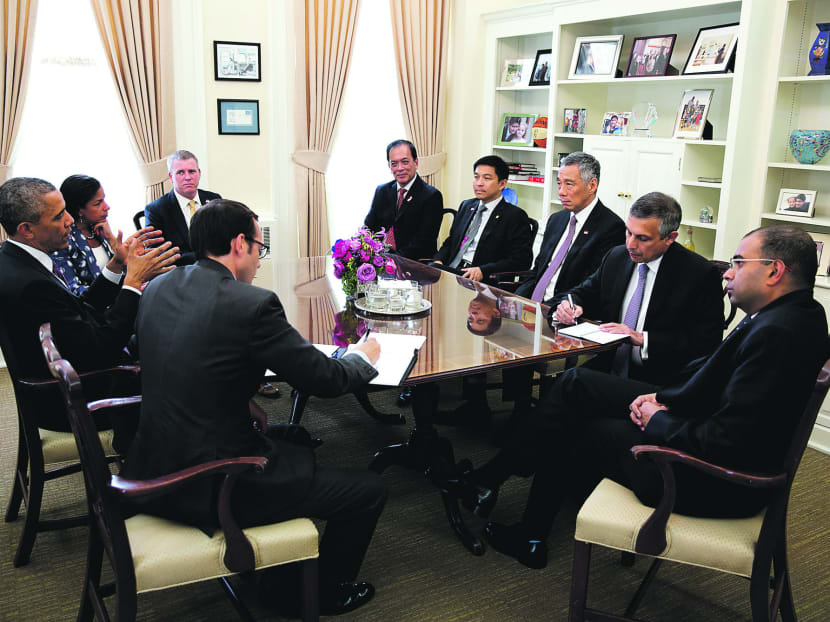US to lose a great deal if TPP pact isn’t ratified: PM
NEW YORK — The United States would stand to lose a great deal if ratification of the Trans-Pacific Partnership (TPP) trade pact became a problem, said Prime Minister Lee Hsien Loong as he wrapped up a six-day working visit to Washington DC and New York.

Mr Obama (left) dropped by US National Security Adviser Susan Rice’s (second from left) meeting with Mr Lee (third from right) in
Ms Rice’s office in the White House on Wednesday.
PHOTO: THE WHITE HOUSE
NEW YORK — The United States would stand to lose a great deal if ratification of the Trans-Pacific Partnership (TPP) trade pact became a problem, said Prime Minister Lee Hsien Loong as he wrapped up a six-day working visit to Washington DC and New York.
In an interview with Singapore media, Mr Lee said failing to ratify the trade pact would be very damaging and call into question the US’ commitment to and engagement with the Asia-Pacific region.
Negotiations for the TPP — which involves the US and 11 other countries including Japan and Australia, which combined make up about 40 per cent of the world’s gross domestic product — could conclude by November. US’ ratification of the trade pact requires the support of its Congress.
Mr Lee, who met Congressmen and other key officials during his trip, said he made the TPP pitch to everyone he met and received a range of reactions.
“I think many understood the imperative, but there are some political considerations, of course. You’ve got the elections coming and even beyond the elections, you want to have something which is saleable to the voters,” he said. “And while a good number said yes … there were also a few who listened to me and reserved their positions. So I don’t know how they will decide, but I hope I have left them something to think about.”
Mr Lee has pitched strongly for the TPP in recent days, such as during a dialogue held at a think tank in Washington DC. He also called on business leaders to lend their support at such events as a reception to commemorate the 10th anniversary of Singapore’s free trade agreement with the US.
The TPP is a key part of the US’ rebalancing towards Asia and an instrument to deepen this relationship, he said. The region is moving, such as through the Regional Comprehensive Economic Partnership involving the Association of South-east Asian Nations, China, Japan, South Korea, Australia, New Zealand and India. “So if America is not moving, you may be part of the game, but you’re not in play.”
Asked about the receptiveness of US Vice-President Joe Biden and National Security Adviser Susan Rice during meetings with them, Mr Lee said they are completely convinced of the TPP. It was foremost on US President Barack Obama’s mind when he joined the meeting with Ms Rice for a few minutes, Mr Lee added.
“So I’m convinced that the Administration wants it; what we need to be able to know is that between the Administration and Congress, and the American people, they can work together to deliver the ratification.”
Mr Obama was reported last week saying he hoped for a document to present to the public and stakeholders by the time he travels to Asia in November. The meeting of the Group of Twenty leaders will take place in Australia and the Asia-Pacific Economic Cooperation (APEC) leaders meet in Beijing that month.
On how the South China Sea disputes between China and four Southeast Asian countries affect the US’ rebalancing towards Asia, Mr Lee said the Americans’ strategic move is happening regardless of specific issues, such as the territorial rows in the South and East China Seas.
The US has a legitimate interest in the South China Sea issue because of freedom of navigation and international law, but stable US-China relations are important, he said. “I told them, it depends on what you say, it depends on how you act, also it depends on how you interact with China and with the other participants in the region.”






